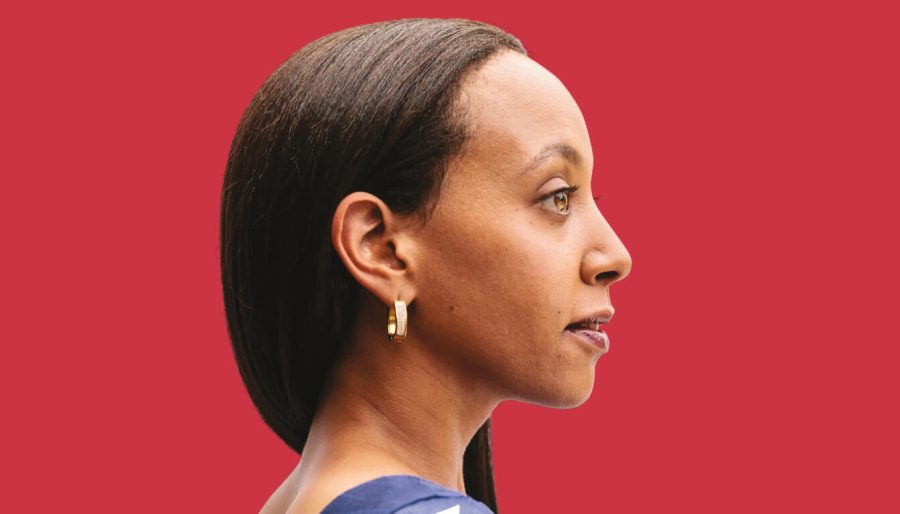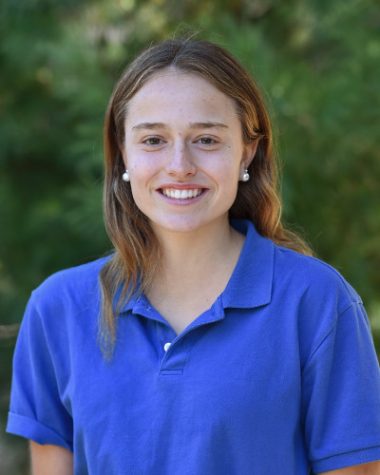Haben Girma: The DeafBlind Woman Who Advocates for Disability Rights
February 24, 2022
On February 10, 2022, Upper School students packed the auditorium, eagerly waiting to hear the guest speaker. After a couple of minutes, everyone in the crowded room hushed their voices and turned their heads to watch Haben Girma, a Deafblind woman, walk to the podium with her adorable service dog, Milo. Girma immediately captivated the audience with her talented public speaking skills and her insightful messages about the barriers disabled people face due to ableism – a systemic belief that disabled people are inferior to non-disabled people.
Girma was born on July 29, 1988, in California. Growing up, individuals assumed that impaired vision and hearing would prevent Girma from going to school, getting a job, and participating in society. Despite their initial concerns, Girma’s disability did not stop her from advancing in the world. Girma went on to accomplish remarkable feats: she wrote a book, graduated from Harvard Law School, and became a disability rights advocate. It was not the tasks themselves but the assumption by others that Girma could not complete the tasks that presented obstacles.
Girma said, “If you find yourself thinking a disabled person can’t do this, ask yourself, is that ableism because I am making assumptions? Because we all accidentally and inadvertently make assumptions. There is a lot of ableism in our society, and people just kind of learn to assume. So we need to actively work on catching ourselves.”
Girma learned how to use her amazing sense of touch to her advantage. Feeling the arrangements of dots on her fingertips, Girma mastered the art of reading and writing braille. In primary school, she connected with her peers and absorbed information via a digital braille device.
Resources and tools that offer alternative ways to accomplish tasks and endeavors have a significant impact on people who are disabled. Institutions that have the means to find alternative ways and/or purchase technology that aids disabled people should go the extra step to be accessible to everyone.
Girma said, “If you have never had a disabled person in a program, that is a sign that there are barriers. Pause and ask, what are the barriers, and let’s do that work of removing the barriers to make our communities more acceptable.” Girma believes disability is an opportunity for innovation, and she teaches organizations the importance of choosing inclusion.
Toward the end of her speech, Girma opened the floor to students and faculty who had questions. To communicate with the St. Luke’s community, Girma used her own invention: a braille notetaker. Individuals type their comments on the keyboard, transmitting the letters to Haben’s BrailleNote (a small, black device) in real-time. Fast-paced, her left hand glides over her braille display. Haben started the Q&A by first ensuring people not to “worry about spelling or punctuation.”
One student asked Girma about how she would describe the feeling of the ocean. Girma responded, “The defining feature of the ocean is the waves, and it is amazing how unpredictable they are. You will get a gentle wave and a really powerful wave. It is a great metaphor for life. So much is unpredictable. I think that I really appreciate the challenge of trying to balance and navigate the unpredictable ocean.”
Girma has dedicated her life to creating a world in which inclusion is the norm. She encouraged the SLS community to be more aware of ableism, and find ways to improve the conditions to help disabled people. In the moments preceding her visit, I heard many students talking about whether or not SLS is accessible and welcoming to everyone. The pressure to shape an equal world should not fall on disabled people. Girma inspires us to be advocates and supporters of Disability Reform.





Peter Hanson '57 • Mar 5, 2022 at 9:47 pm
This piece is profound. I learned from it, and I am impressed with Ale’s insight and caring.